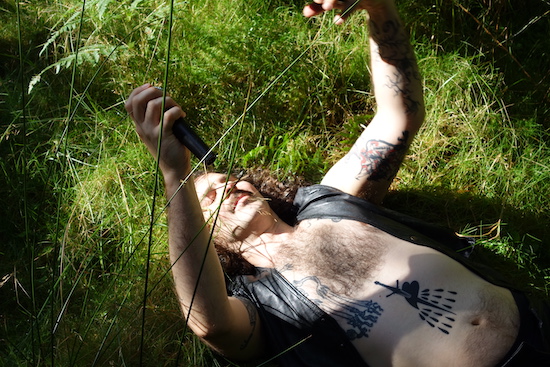Photo by Holly Allan
Back in 2018, I wrote an unpublished novel featuring a scene in which a schoolboy is washed away on a river of phlegm after falling into his school’s “Gob Pit”. Christoforos, objectively the best chip shop in Worthing, is located just around the corner from the house which I grew up in. The patron of that particular establishment happens to be the father of one Michael Kasparis. Fast-forward five years and Kasparis has released his third album of ecstatic synth-pop under the Apostille moniker, on which, three tracks in, the song ‘Spit Pit’ appears. If Michael also happened to grow up in Worthing then I’m starting to wonder if I’ve repressed a grotty memory of spittle assault rather than merely harbouring a repulsive imagination.
As masochistic tales of submissive flob-play go, this one’s a doozy. All acid squelches, bustling breaks, and chest-testing bass. If it wasn’t for Kasparis’ crooned vocals sagely advising “Accept the rain” you’d be forgiven for thinking this had crawled out of sessions for I Care Because You Do. As is the case with much of Prisoners of Love and Hate, there’s a sense of familiarity but with a pitch-black twist.
Opener ‘Saturday Night’ is a case in point. Kasparis subverts the one hit wonder which unleashed a dance routine that went on to ravage unsuspecting school discos throughout the 90s. Rather than hedonism, this celebrates mere survival. The reassuring but catchy “It’s Saturday night and we’re all still breathing” encapsulates the wild abandon of scarcely making it through yet another week. Is there a better explanation of how the times have changed since Whigfield clogged up the charts, than having our hopes for Saturday night reduced to little more than respiration continuity?
Kasparis is clearly no stranger to the charms of electronic pop music but the references here are increasingly more mainstream and diverse than on previous releases. Vestiges of pop songs ring consistently throughout Prisoners of Love and Hate. Melodies and vocal lines dangle the carrot of recognition only to whip it away before any accusations of plagiarism could rear their heads. ‘Natural Angel’, for instance, with its striding 80s synth reimagining of Springsteen in ‘Born To Run’ mode contains the lyrics “I’ll never forget the way you’re looking at me right now”, echoing both Chris De Burgh and Meat Loaf alongside a palm-muted throb. And Kasparis even has his own take on ‘Summer of ’69’, looking back 20 years to halcyon days of being “free and forever” whilst riding a Eurodance bounce.
Then there’s ‘People Make This City’, with its pondering line “Am I too much for this town?”, coming across as the sort of electro-ballad you might expect to find lurking on an Alex Cameron record. The dark-edged synth-pop ode to dissipating love amongst shipwrecks – ‘Rely On Me’ – is pure dance-your-pain-away Soft Cell. Whereas the finale, ‘Feel Good’, recalls early 2000s dance mega-hit ‘Set You Free’ by N-Trance. The bumping piano lead and rushing drums elevating this lo-fi bedroom party into laser-reaching euphoria as Kasparis sings “You can make me feel good”.
In one of the more melancholy sketches from the first series of Limmy’s Show, the eponymous comedian holds up a photograph and quizzes a train station ticket office clerk on how to get to the place in the picture. It turns out it’s the seaside town of Millport, on the Isle of Cumbrae, but he doesn’t want to travel to the physical place as much as he wishes to go back to the time that the photo was taken. When he was 16 and carefree, getting drunk on the beach, causing mischief with his pals.
Much like his fellow Glasgow resident, Kasparis is longing for a past now gone, grasping for those halcyon days which, as with these almost recognisable ear worms, remain just out of reach. There’s a rose-tinted sense of more innocent times on Prisoners of Love and Hate. The touchstones might be all over the musical map (and perhaps a little unexpected from a former member of caustic, confrontational punk acts The Lowest Form and Anxiety) but there is an odd sense of internal logic to it all. It’s as if we’re experiencing a hopeful musical landscape distilled through the kaleidoscope of Kasparis’s tastes and experience. The album acts as a time machine, bleeding in choruses, hooks, leads, and instrumental palettes from a range of eras, across constantly shifting airwaves. It’s not so much damning the hedonism of Whigfield, as sharing a sense of despondency that it is no more. That hanging in there is the best that can be hoped for until such a time that it is possible to return to an era of our choosing.
But the truth is that our memories almost certainly play tricks on us. We subconsciously cherrypick our recollections for good and for bad. The reality behind that Limmy sketch is darker than presented. According to The Scotsman, whilst he was on holiday in Millport Limmy “got drunk, became upset over a girl and slashed one of his wrists with a broken bottle of Merrydown cider.” It’s about all that we can do to form narratives that comfort and reassure us. Prisoners of Love and Hate does this whilst spinning snappy refrains over buoyant electronics, resulting in an infectious, fun-filled, yet melancholia-drenched album with a lingering sense of corrupted recall. Like a contagious form of musical amnesia, the taste of each memory carefully side-steps the tip of your tongue. This is to be savoured much like a fine wine. Take a gulp and roll it around your tastebuds. Just don’t spit it out.




